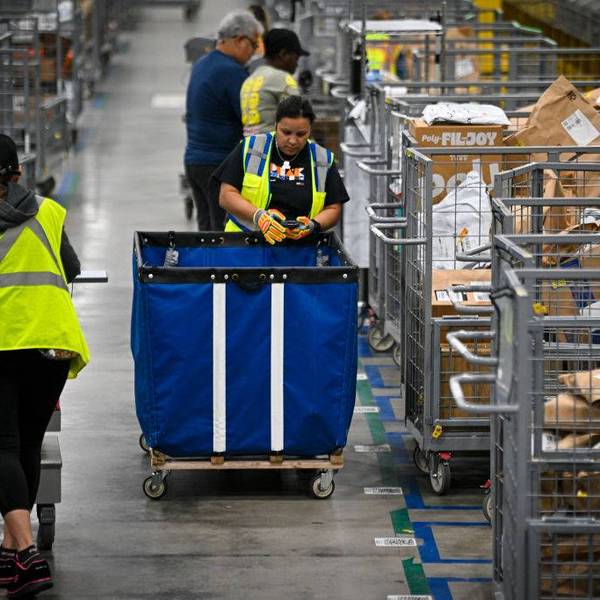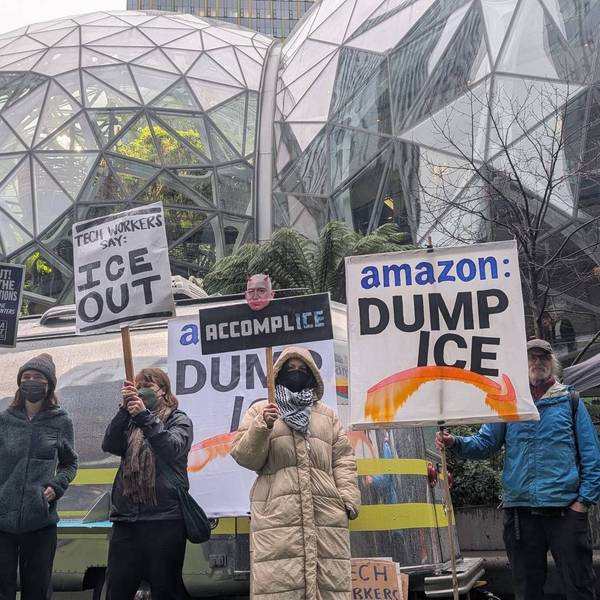Amazon failed to protect contract workers in Saudi Arabia from human rights abuses that may have amounted to human trafficking.
That's one of the findings from an Amnesty International exposé and combined reporting from NBC News, the International Consortium of Investigative Journalists, Arab Reporters for Investigative Journalism, and The Guardian, all published Tuesday. The investigations focused on men recruited from Nepal to work at Amazon warehouses in Saudi Arabia, where they found themselves faced with low pay, unhealthy living conditions, and no job security. When they complained directly to Amazon managers, nothing changed.
"You are in this position because of our work," one of the workers addressed Amazon founder and executive chairman Jeff Bezos, as The Guardian reported. "You would not have been in that position without the efforts of laborers and helpers from Nepal, the Philippines, India, Bangladesh, Pakistan, and others. But you are ignoring workers' concerns."
"It's time for Amazon to finally put things right for workers who have suffered so much."
The Amnesty International report, "Don't Worry, It's a Branch of Amazon": Exploitation of Migrant Workers Contracted to Amazon in Saudi Arabia, focused on 22 Nepali men recruited between 2021 and 2023 to work at Amazon warehouses in Riyadh or Jeddah. They were employed by third-party contractors Abdullah Fahad Al-Mutairi Support Services Co. (Al-Mutairi) and Basmah Al-Musanada Co. for Technical Support Services (Basmah).
The journalistic investigation, published through the network Trafficking Inc., spoke to 54 Nepalese men, 49 of whom were hired through Al-Mutairi. According to both investigations, workers said they were recruited under false pretenses, with 48 telling journalists that they were promised they would be working directly for Amazon.
"I realized it was a different company on the day of the flight," a worker named Bibek told Amnesty International. "I saw on my passport it said, 'Al Basmah Co.' but the agent said, 'Don't worry, it's a branch of Amazon.'"
Once in Saudi Arabia, the workers found themselves making less than direct Amazon employees, even though they had had to pay fees ranging from $830 to $2,040 to secure the jobs in the first place, many taking out high-interest loans.
Their living conditions were cramped and unhealthy, with workers reporting bed bugs, salty water, and faulty air conditioners. When there wasn't work, contractees would be let go and moved to even shoddier housing, which “was extremely dirty," a worker named Kiran told Amazon. "No air conditioning, no fans. The temperature was 50°C… There are so many workers… no beds, cooking gas, or drinking water. There was no internet so we couldn't contact our family."
When workers were let go, they stopped receiving a salary, but were also not allowed to return home unless they paid a steep fee to exit their contracts, which was as high as $1,300 for worker Momtaj Mansur, as NBC reported.
"I told them: Either kill us or send us home, but don't give us so much pain," Mansur told journalists.
His family ultimately took out a loan with a 36% interest rate to bring him home.
"Amazon knows each and every problem we have with the supply company."
"The workers thought they were seizing a golden opportunity with Amazon but instead ended up suffering abuses which left many traumatized," Steve Cockburn, Amnesty International head of economic and social justice, said in a statement. "We suspect hundreds more endured similar appalling treatment. Many of those we interviewed suffered abuses so severe that they are likely to amount to human trafficking for the purposes of labor exploitation."
What's more, several workers said that they complained to Amazon about working conditions to no effect. Complaints raised in 2021 went unanswered as of 2023, according to Amnesty International. Sometimes, the workers were threatened with retaliation by the third-party employers.
When a group brought up the brackish water in their living quarters, "Al-Mutairi threatened us," one worker told NBC, saying: '"Who complained about this? We will make him jobless!'"
Another worker told Amnesty that an Al-Mutairi supervisor pulled him into an office and pushed and slapped him after he raised concerns about the water to Amazon. When the worker then told an Amazon manager, they responded that it wasn't their business.
"Amazon knows each and every problem we have with the supply company," a worker named Kiran told Amnesty. "Amazon asks workers about the problems and issues they face during daily meetings."
Cockburn said that Amazon "could have prevented and ended this appalling suffering long ago but its processes failed to protect these contracted workers in Saudi Arabia from shocking abuses."
"Amazon should urgently compensate all those who have been harmed, and ensure this can never happen again," Cockburn added.
In response to the journalistic investigation, senior vice president of worldwide operations at Amazon John Felton said that an internal investigation by Amazon had turned up violations by a third-party vendor in Saudi Arabia, and the company had made a plan with that vendor to change its operations so that workers would be paid back for missed wages and recruitment fees and housed in safe and healthy accommodations, among other reforms.
"While we considered immediately suspending this vendor when these allegations came to light, we determined that it was in the best interests of their employees, many of whom traveled from other countries to Saudi Arabia for work, to instead work diligently with the vendor to make significant changes to their operations," Felton said in a statement.
Amnesty recommends that Amazon move to hire more workers directly and monitor third-party contractors more closely. It welcomed Amazon's move to compensate workers, but said none had received their owed payment to date.
"It's time for Amazon to finally put things right for workers who have suffered so much, and for Saudi Arabia to fundamentally reform its exploitative labor system," Cockburn said.
The kingdom could do more to protect foreign workers by carrying out its own investigations and ensuring workers' "fundamental rights, including being able to freely change employers and leave the country without conditions," Cockburn said.




